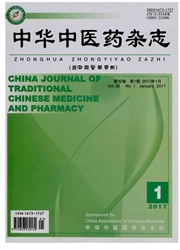

 中文摘要:
中文摘要:
目的:观察在常规他汀类药物治疗基础上加用活血解毒中药新清宁片对冠心病稳定期患者血清炎症标志物及血脂的影响。方法:将30例冠心病稳定期患者随机分为3组:他汀对照组,给予他汀类降脂药常规治疗;活血中药、活血解毒中药组,在他汀类药物常规治疗基础上分别加用丹七片、新清宁片,每组10例,疗程1个月。观察治疗前后血清超敏C反应蛋白(hs—CRP)、肿瘤坏死因子-α(TNF—α)、血脂水平及血瘀证计分的改变。结果:活血解毒中药组血清hs—CRP浓度明显降低[治疗前后差值(6.83±4.99)mg/L],较他汀对照组(1.90±2.15)mg/L及活血中药组(1.49±1.48)mg/L有显著差异(P〈0.05或P〈0.01),各组对血清TNF-α水平影响无显著差异;活血解毒中药还可明显降低血清总胆固醇(TC)和非高密度脂蛋白胆固醇(non—HDL—C)水平,并可升高血清HDL-C浓度,同时还可降低血清载脂蛋白B威脂蛋白A(ApoB/A)比值及动脉粥样硬化指数(AI),较治疗前有显著差异(P〈0.05或P〈0.01);活血解毒中药组治疗后血瘀证计分(11.86±4.53)较治疗前(17.14±3.63)亦明显降低(P〈0.05)。结论:对于他汀药常规治疗的稳定期冠心病患者,加用活血解毒中药新清宁片可进一步降低血清炎症标记物hs—CRP水平,改善血瘀状态,并有较好的辅助综合调脂作用,优于加用活血中药丹七片,值得深入研究。
 英文摘要:
英文摘要:
Objective: To observe the additional effects of Xin Qing-ning Tablets, a representative herb with the effect of activating blood circulation and detoxication (ABCD) consisting of rhubarb extractives, on the serum inflammatory markers and blood lipids in stable coronary heart disease (CHD) patients receiving standardized statins treatment. Methods: Thirty stable CHD patients were randomized to three groups (10 in each group): the control group treated with standardized statins; the ABC and ABCD group, treated with Dan Qi Tablets or Xin Qing-ning Tablets respectively in addition to standardized statins treatment. After one month treatment, the concentrations of high-sensitivity C reaction protein (hs-CRP), Tumor necrosis factor- α (TNF- α ) in serum, blood lipid and bloodstasis syndrome score (BSSS) of CHD patients before and after treatment were determined. Results: The ABCD group showed superior effects in reducing the concentration of hs-CRP in serum[a difference of(6.83±4.99)mg/L]as compared with the control group (1.90±2.15)mg/L and the ABC group(1.49±1.48)mg/L (P〈0.05 or P〈0.01). As for the concentrations of TNF-α in serum, there was no significant difference among groups. The ABCD group also significantly reduced the concentration of total cholesterol (TC) and non-high density lipoprotein cholesterol (non-HDL-C), increased the concentration of HDL-C, meanwhile decreased the ratio of apolipoprotein A/apolipoprotein B (ApoB/A) and atherosclerosis index (AI), as compared with those of pre-treatment (P〈0.05 or P〈0.01). The BSSS in ABCD group was reduced significantly after treatment (from 17.14±3.63 to 11.86±4.53) (P〈0.05). Conclusions: For stable CHD patients, the treatment with the herb with function of ABCD was superior to the treatment with function of ABC based on standardized statins treatment in inhibiting inflammatory reaction, improving blood-stasis status and comprehensively regulating lipid metabolism, whic
 同期刊论文项目
同期刊论文项目
 同项目期刊论文
同项目期刊论文
 期刊信息
期刊信息
